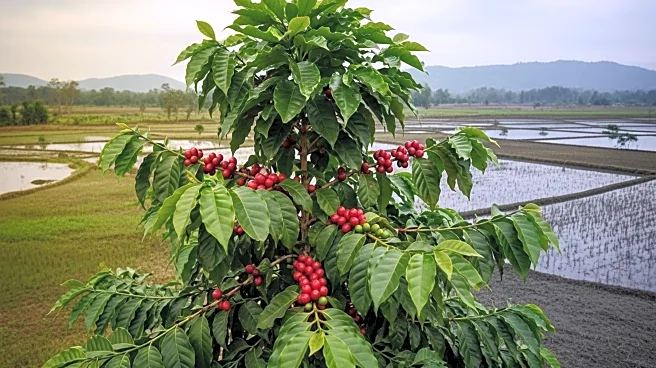What's Happening?
The coffee industry is facing significant challenges due to climate change, which is expected to reduce the land suitable for coffee farming by 50% by 2050. This is particularly concerning for major coffee-producing countries like Brazil and Vietnam. The main variety of coffee sold in the U.S., Arabica, is increasingly difficult to grow at lower elevations due to rising temperatures. Farmers are being forced to plant at higher altitudes to escape the heat. Additionally, droughts are causing defoliation of coffee plants and the death of shade trees, further threatening coffee production. The industry is also grappling with labor shortages and financial pressures, as many coffee farmers live at or below the poverty line and face variable international market prices.
Why It's Important?
The potential reduction in coffee-growing areas could have significant economic impacts, particularly for countries heavily reliant on coffee exports. The U.S. coffee market, which sources much of its coffee from Brazil, could see increased prices and changes in coffee quality. The challenges faced by coffee farmers, including financial instability and labor shortages, could lead to a decline in coffee production, affecting global supply chains. As coffee becomes more expensive and potentially less available, consumers may need to adapt to different coffee varieties or alternatives, impacting consumer habits and preferences.
What's Next?
Farmers are exploring options to mitigate the effects of climate change, such as planting more shade trees and diversifying crops, though these solutions require financial investment. Researchers are investigating alternative coffee species like stenophylla, which can tolerate higher temperatures, and robusta, which is gaining popularity due to its climate resilience. The industry may also see a rise in synthetic coffee products as a potential solution to declining coffee production. As these developments unfold, the coffee industry will need to adapt to changing environmental conditions and consumer demands.
Beyond the Headlines
The historical context of coffee production, rooted in colonialism and slavery, continues to influence the economic conditions of coffee farmers today. The industry's reliance on cheap labor and low production costs has long-term implications for the sustainability of coffee farming. As climate change exacerbates these challenges, there is a growing need for systemic changes in how coffee is produced and marketed to ensure fair compensation for farmers and sustainable practices.










